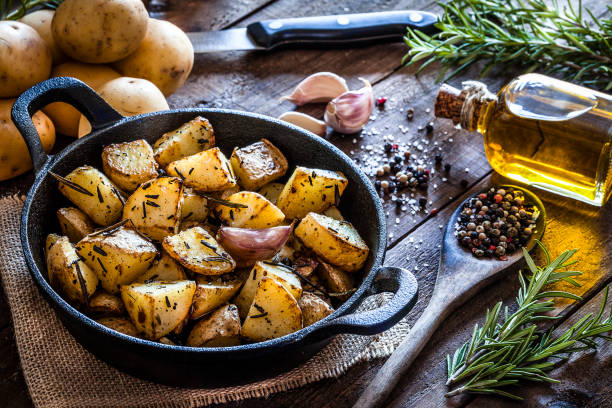Regarding the preparation of baked potatoes, home chefs have long been divided on whether or not potatoes should be poked with perforations prior to baking. There are individuals who assert that this method prevents potatoes from exploding while preparing, while others contend that it is superfluous or potentially adverse to the end result. This article will examine the scientific principles underlying the practice of how to make a baked potato, as well as question its essentiality in the pursuit of an ideal baked potato.
The Rationale Behind Poking Holes
By piercing openings in potatoes prior to roasting, vapor can be effectively evacuated throughout the heating process. A substantial quantity of moisture is present in potatoes; upon heating, this moisture transforms into steam. In the absence of an exit, the vapor accumulates within the potato, generating pressure that may result in its rupture.
We reduce the probability of the potato erupting in the oven by creating venting channels for the vapor through which we pierce the potato with a blade or pointed knife. This is especially crucial when it comes to larger potatoes, which are more susceptible to expanding due to their higher moisture content.
Benefits of Aiming Holes
- Prevents Bursting: By creating perforations in the potatoes prior to baking, one can avert their rupture while they are cooking, ultimately culminating in a more aesthetically pleasing and streamlined end product.
- Even Cooking: Facilitating the departure of vapor from the potatoes contributes to a more uniform cooking process throughout. This process guarantees that the interior and exterior of the potato heat simultaneously, producing a potato that is uniformly cooked.
- Reduces Cooking Time: A minor reduction in cooking time may result from piercing perforations in potatoes, which facilitates the release of vapor and allows the potatoes to cook more efficiently.
Optimal Methods For Preparing Potatoes
Although the ultimate criterion for whether to puncture holes in potatoes prior to baking is personal preference, the following are some guidelines to follow when preparing baked potatoes:
- Size Matters: It is more important to ensure that larger potatoes are adequately punched with perforations during boiling, as they are more susceptible to splitting open compared to smaller ones. Aim for a minimum of four to six incisions, evenly spaced across the surface, per potato.
- Use a Fork or Knife: To create small perforations in the epidermis of potatoes, use a fork or pointed knife to make openings. A potato that has been pierced too deeply may become dried and lose moisture as a result.
- Consider the Method of Preparation: Whether or not potatoes require drilling holes can vary based on the preparation method employed. It may be less important for potatoes prepared in the microwave or slow cooker, where vapor can escape more readily, compared to oven-baked potatoes.
Consider brushing baked potatoes with olive oil or melted butter and seasoning them with herbs, salt, and pepper prior to baking to increase their flavor.
Conclusion
Both parties in the debate regarding whether or not potatoes should be pierced prior to baking have legitimate points of view. Although creating perforations in potatoes can aid in uniform cooking and prevent them from splitting open, it can also result in saggy skin, flavor degradation, and nutrient loss.
Determining whether to puncture potatoes prior to baking is, in essence, a matter of individual inclination. While some chefs swear by this method and would never bake potatoes without it, others discover that it has little impact on the end result. Engage in experimentation to determine the most effective approach and savor the delectable outcomes of flawlessly baked potatoes, irrespective of your inclination towards making openings or not.

